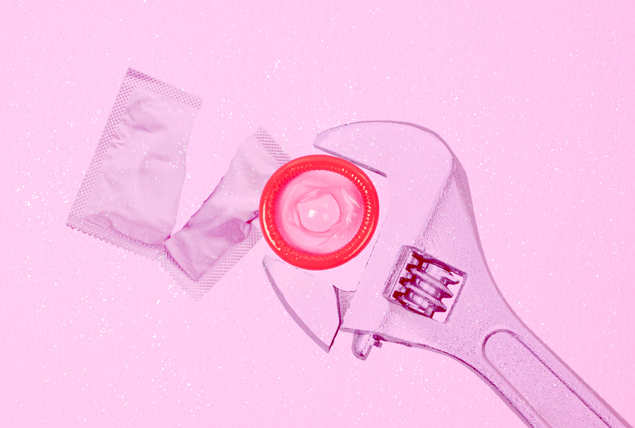Maintaining Your Sexual Health: Intimacy, Education and Caution

A healthy sex life is good for you physically, emotionally and mentally, and a key part of a healthy sex life is maintaining your sexual health. That means knowing about your body, your reproductive health, sexually transmitted diseases (STDs), healthy relationships, your identity, sexual orientation and much more.
Overall, sexual health is roughly the same for everyone, though there are nuances between men's and women's sexual health. Here, we will focus on sexually transmitted infections (STIs) and STDs, protecting your sexual health, sex education and resources that can help.
STDs vs. STIs
STI and STD are often used interchangeably but can have slightly different meanings.
An STI is an infection that is transmitted through sexual contact, while an STD refers explicitly to an infection that has progressed to a point where it causes symptoms or disease, explained James J. Elist, M.D., a urologist in Beverly Hills, California, who specializes in impotence and male sexual dysfunction.
"So, all STDs are STIs, but not all STIs are STDs," he said.
Some common STDs that people should be aware of, according to Elist, include the following:
- Chlamydia is a bacterial infection that can cause pain or discharge from the genitals but often has no symptoms.
- Gonorrhea is another bacterial infection that can cause similar symptoms to those of chlamydia but can also lead to more serious health problems if left untreated.
- Genital herpes is a viral infection that causes outbreaks of sores around the genitals.
- Acquired immunodeficiency syndrome (AIDS) is an STD that can develop if the STI that causes it, human immunodeficiency virus (HIV), is not treated.
- Syphilis is a bacterial infection that can cause a range of symptoms, from sores to rashes to even death, if not treated.
"It is important to practice safe sex and get regular checkups to screen for STDs, as many can have no symptoms but can lead to serious health problems if left untreated," Elist said.
Managing and protecting your sexual health
Protecting your sexual health and preventing STIs and STDs is a continuous effort. Elist stressed that people should not rely solely on one method of protection and should get regular checkups to ensure good sexual health.
His top five tips for managing your sexual health are:
- Practice safer sex. Use condoms or dental dams during sexual activity to help reduce the risk of infection.
- Get tested. Regular testing is essential for early detection and treatment of STIs and STDs.
- Discuss STIs and STDs with your partners. Before engaging in sexual activity, it is important to talk openly with your partners about your sexual health and history.
- Get vaccinated. Some STIs, such as HPV and hepatitis B, can be prevented by getting vaccinated.
- Be aware of symptoms. Seek medical attention if you experience sore rashes, discharge or pain in the genitals.
Sexual health education
Sexual health education is a vital part of public health because it gives young people the knowledge and skills they need to manage and protect their sexual health throughout adulthood.
When sex ed is introduced at a young age, it teaches youth how to take care of themselves and others, according to Michelle Slaybaugh, the director of social impact and strategic communications with SIECUS, or Sexual Information and Education Council of the United States, a national voice for comprehensive sex education. Through these teachings, young people are able to grow up with skill sets they may not otherwise learn.
"Sex ed teaches people about their body parts, consent, preventative measures for pregnancy and STDs/STIs, how to better communicate with others, how to be more inclusive and so much more," she explained.
Due to current federal policies, the options for sex ed classes and curriculum vary between states. However, sex ed can start at home through open discussions and sharing of resources.
Culturally responsive sex ed may have the following outcomes:
- Understanding and appreciation of sexual diversity
- Intimate partner violence prevention
- Development of healthy relationships
- Prevention of child sex abuse
- Avoidance of unintended pregnancies
- Avoidance of STDs/STIs
How sexual health affects relationships and intimacy
Sexual health significantly impacts the overall satisfaction of relationships and the level of intimacy within them. It can affect our self-esteem, as well as how we feel about ourselves in terms of our relationship, according to Lisa Lawless, Ph.D., the founder and CEO of Holistic Wisdom, a sexual wellness company based in Bend, Oregon.
"This can influence how we communicate with our partners and create the possibility of trust issues and misunderstandings when we are not open and honest about sexual health challenges," she said.
It is essential to address sexual health concerns such as erectile dysfunction (ED), female sexual dysfunction, pain during sex, low libido and STDs. Lawless said our vulnerability with one another is a major component of what fuels intimacy, and discussing these issues openly and approaching them as a team can bring couples closer together.
"Invisible" disabilities, or disabilities that are not readily apparent, can be especially challenging for couples. They can cause people to feel insecure and self-conscious or face discrimination and bias. Such disabilities can even affect their ability to form and maintain intimate relationships.
"Those with invisible disabilities can unintentionally create emotional distance in established relationships by hesitating to communicate specific needs out of fear of burdening a partner or feelings of insecurity," Lawless said.
A partner may struggle to understand or support their loved one's needs due to bias or a lack of understanding or compassion, she added.
"This is why education about the sexual challenges caused by invisible or visible disabilities is so important and why seeking helpful solutions is vital," Lawless said.
When couples communicate about these issues, they can find support through healthcare professionals as well as a variety of helpful solutions. For example, Lawless advised many products can help couples overcome sexual health issues, such as the following:
- Wearable penis devices
- Vibrators (male and female)
- Moisturizing lubricants
- Dilators
- Pelvic floor trainers and Kegel exercises
"By utilizing support systems and helpful products, couples can find answers to sexual health challenges and increase their overall sexual satisfaction. This, of course, can increase intimacy and strengthen a relationship," she explained.
Helpful resources
Here are a few resources you can access online to help you understand and manage your sexual and reproductive health, whether individually or as a couple:
- Planned Parenthood. Everything you need to know about sexual health and relationships; this includes resources for teens, adults and educators.
- American Sexual Health Association. Sexual health resources for teens, adults, parents, teachers and medical providers.
- Find My Method. Information on contraception and safer sex.
- National Coalition for Sexual Health. A coalition working together to improve the sexual health of Americans nationwide. The website hosts sexual health information for both the public and providers.
- SIECUS: Sex Ed for Social Change. Focuses on advancing comprehensive sex education.
If you find that ED—yours or your partner's—is causing intimacy issues and relationship strife, know that you have options. One of the newest ED treatments on the market is Eddie®, an FDA-registered Class II medical device designed to treat erectile dysfunction and improve male sexual performance. Shaped to fit the penis and work with the natural physiology of an erection—blood is allowed in but not out—Eddie proved effective in treating men with physically, psychologically and pharmacologically induced ED in 2021 clinical trials.


















